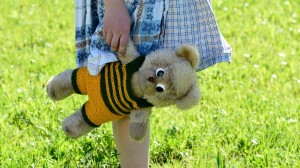 Q. We have a five-year-old daughter who is very attached to her teddy which she seems to need all the time. Very often her mood can be hugely influenced by the availability or not of the toy. Should we allow a limitless contact with the teddy, even if a side effect is sucking her thumb and possibly affecting her teeth? She is generally a very good child otherwise.
Q. We have a five-year-old daughter who is very attached to her teddy which she seems to need all the time. Very often her mood can be hugely influenced by the availability or not of the toy. Should we allow a limitless contact with the teddy, even if a side effect is sucking her thumb and possibly affecting her teeth? She is generally a very good child otherwise.
A. About 60 per cent of young children develop an attachment to a special toy such as a teddy or a blanket which they use as a comforter when they are tired or stressed or as part of the bedtime routine to help them sleep. From a psychological perspective these are called “transitional objects” as they represent a transitional stage from the child depending on comfort from their parents to being self-reliant and able to comfort themselves.
Generally, transitional objects are thought to be a good thing for children because they help them learn to relax and regulate their emotions and can be a practical prop in helping children settle to sleep at night. They only are a problem if they become socially inappropriate or if the child becomes overdependent in a way that interferes with their life (for example, if a child feels the need to take a teddy to school everyday, when this may not be possible).
Often children grow out of their dependence on a toy in their own time, or at least learn to restrict it to limited use. For example, some children will stop using their teddy during the day as they get older (perhaps due to peer pressure), but will continue to use it as a comfort at bedtime.
You have the added complication of your daughter sucking her thumb and possible affecting her teeth. However, if you are concerned, I think you might be able to separate these issues and continue to allow your daughter access to her teddy, but only if she does it without sucking her thumb.
You could also explore with your daughter learning other comfort strategies that are not dependent on having her teddy with her, such as using another toy, or teaching her how to relax herself, maybe by reading, doing exercise or sitting down in a relaxing space and counting her breaths. The bigger repertoire of strategies she has, the better for her.
Dr. John Sharry, Irish Times, February 2011. John writes in The Irish Newspaper Health+Family every Tuesday.
